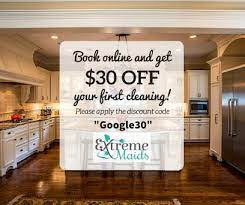Vinegar is a wonderfully effective substance in the fight against grime and germs, and is an environmentally friendly way to combat dirt in and around the home. In fact, many professional cleaning companies (unless asked not to by a client) use white vinegar to keep surfaces spotlessly clean and free from bacteria.
If you haven’t yet discovered the benefits of cleaning with vinegar, but would like to give it a go, here are some pointers, tips, do’s and don’ts for using diluted vinegar (1 part vinegar to 3 parts water) around the home:
- Clean windows, mirrors and other glass items without streaks
- Clean floors, even hardwood floors
- Create an all-purpose cleaner by adding a few drops of essential oil
- Clean a grubby microwave by filling a microwaveable bowl with vinegar and water, and cooking it on high for a minute. Wipe away any remaining stains or debris, and repeat if necessary
- Refresh grotty garbage disposals by pouring a cup of baking soda down the disposal, adding a little vinegar, and rinsing with hot water
- Clean the outside of pots and pans with the help of a magic eraser and some of the vinegar/water solution
- Combat pet stains and odors by mixing the vinegar and water with a few drops of dish soap, and scrubbing
- Rejuvenate your dishwasher by filling a cup of vinegar and running a normal washing cycle
- Clean window tracks by adding some of the vinegar and water solution to a spray bottle, spraying it onto the tracks, before adding a little baking soda, and scrubbing with a soft brush (a toothbrush works well)
- Sanitizing fresh fruits and vegetables; it won’t leave a funny taste or smell behind provided you rinse the items with clean water
- Unblock drains with neat white vinegar and if necessary, add some baking soda before pouring the vinegar down
- Clean rusty utensils or tools with neat white vinegar, by leaving them submerged in it for up to 12 hours
Now, while vinegar can work wonders for cleaning many things around the home, it absolutely shouldn’t be mixed with the following substances:
- Bleach – when vinegar is mixed with bleach, it creates what is called a Toxic Chlorine Gas, and if this were to get onto your skin or into your respiratory system, it can leave you with horrible chemical burns
- Hydrogen Peroxide – this combination creates a substance known as Peracetic Acid, which can be dangerous
- Baking soda – while vinegar can be safely mixed with baking soda when creating a cleaning solution for use in the home, it is only 100% safe if not combined in a spray bottle. It’s possible that were the bottle to be closed up immediately after adding vinegar and baking soda, a gas between the two ingredients could be created, causing an explosion. Although this would usually only happen in the first 30 seconds or so, it isn’t really worth experimenting with
Overall, white vinegar is a highly effective and 100% natural substance that can be used safely for a wide range of cleaning tasks around the home, and as mentioned, you might even notice that local cleaning companies are using it too.

